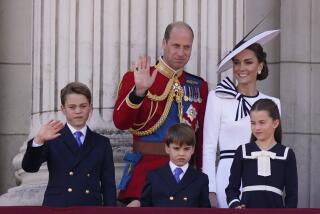A Colonial Triumph for ‘Lord and Lady Di’
- Share via
As an Englishman, I rooted for the Prince and Princess of Wales--”Lord and Lady Di,” as a Los Angeles newscaster recently called them by a felicitous Freudian slip--in America. It was like watching the trapeze artist or tightrope-walker in the circus: You sincerely wanted them not to come a cropper, yet much of the excitement was generated by the knowledge that they could.
Of course one cannot expect the citizens of a republic to have quite the same feeling as the British do for Prince Charles--symbol of an heir to a once-tyrannous monarchy. Even in England we don’t talk much about the “Divine Right of Kings” now, or the “divinity that doth hedge a king.” The Queen says “My husband and I,” not “We and our husband.” But many of the old pomps are still maintained.
The monarchy is prayed for in Church of England services. The Queen opens Parliament. We still talk of her being “graciously pleased” to grant an audience. To most of the British nation Charles represents far more than an ordinary youngish man with rather prominent ears, doing a good PR job.
It is becoming clear that he is not at all ordinary; Prince Charles has become a consummate salesman for Britain. He parries journalists’ questions with a deftness that career politicians might envy. And then there is the matchless “Princess Di.” At press conferences she sits demurely behind the prince, her Myrna Loy lips sealed by protocol; but however nasty (and untrue) the rumors about her become, no one can doubt that she is the garnish that Charles’s act needed. A flash of style with his formality; a touch of temperament with his British phlegm.
It all bodes well for the monarchy. At the time of the raffish Edward VII, who himself succeeded a mother (Victoria) who had sunk the country in gloom as she endlessly mourned Prince Albert, republicanism became an almost respectable political creed--though politicians who embraced it might whistle for knighthoods or peerages. Confidence was restored by the worthy George V; but then came another crisis when Edward VIII (later Duke of Windsor) abdicated to marry Wallis Simpson. Again there were murmurings: Why not do away with the whole archaic apparatus of monarchy, which cost the country such a pretty penny and which had such a luck-of-the-drawer basis? (“You might as well choose somebody because he was born under Sagittarius,” G.B. Shaw acidly suggested.)
Fortunately for Britain, the next two monarchs out of the drawer--George VI and his daughter Queen Elizabeth II--were crackerjacks. No one who remembers the London Blitz of the 1940s can forget the example set by the royal family. They remained in Buckingham Palace while bombs rained down, and they visited the homeless each morning with a complete disregard for their own safety. Queen Elizabeth the Queen Mother--George VI’s widow and at 85 still marvelously active in public life--is surely the best-loved person in Britain. Her daughter, Queen Elizabeth, has never put a foot wrong. This is not through being tame or insipid. On occasion she has made her views forcefully apparent, as when she stated that the presence in Britain of a Danish film-maker who had made a pornographic film about Christ would be “objectionable.” (He was refused entry.)
There is a sense that she is “mother of the nation,” holding together its conflicting elements--an honorific title that even the prime minister’s most ardent supporters could not accord Thatcher.
Some think that Queen Elizabeth will soon step down, now that Charles is properly “settled” with a wife and heirs, for him to become King while he is in his prime. Personally I think it unlikely. The Queen knows how content the British people are with her. (They showed it vociferously when she “went walkabout” in 1977, the year of her silver Jubilee; and they show it still whenever she appears in public--which is not too often. She knows better than to careen about the streets on a bicycle like the Dutch royal family. Inaccessibility has its virtues.) I have a feeling that Queen Elizabeth is out to beat Victoria’s record--”Sixty Years a Queen.” And, arguably, Charles does a better job for his country now, when not tied to London by official duties, than he would if enrolled among the few surviving “majesties” of the world.
More to Read
The biggest entertainment stories
Get our big stories about Hollywood, film, television, music, arts, culture and more right in your inbox as soon as they publish.
You may occasionally receive promotional content from the Los Angeles Times.










